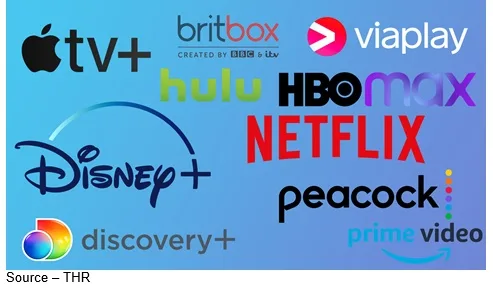Getting the Best from Streaming Services
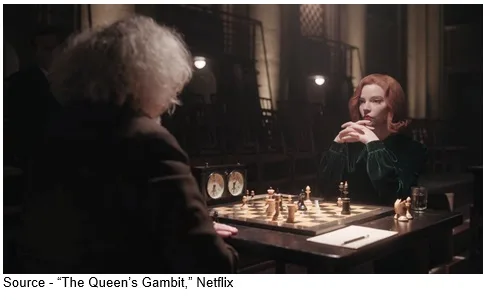
We played chess a little bit while in college. It was a way to feel like you were doing something constructive while skipping classes and if you were winning, you weren’t wasting time.
And before you ask … no, we weren’t that great at it.
In retrospect, it’s a little like streaming … you know what you want, it’s just complex to get there. But at least with streaming it’s getting easier, but still more complex too.
Simple?
Yep, viewers simply want what they want, when they want it on the screen in front of them wherever they are.
Suddenly, things are starting to get a little bit more difficult.
Everyone has the answer!
Every streaming service – Disney+, Netflix, Paramount +, Discovery +, Warner, Sky, Hotstar, Youku, iQiyu, Tencent Video, Hulu, BritBox, Joynt+, Uncut, Amazon Prime, Stan., Foxtel Now, Muvi, Jawwy, Shahid, Abema and Tsutaya (more than 1,000 around the globe) have the answer … simply sign up for their service and BAM! you’ll get the content you want.
More than ever before, the rise of OTT and VOD has somewhat opened the door to give people precisely the content they want.
For us?
Yes, we like some of Netflix’s content … some of Disney+ … some of Amazon Prime … some Apple TV+… some of Tubi … some of Pluto … and some of Discovery+.
Heck, we even like some of HBO Max … some of BritBox … some of…
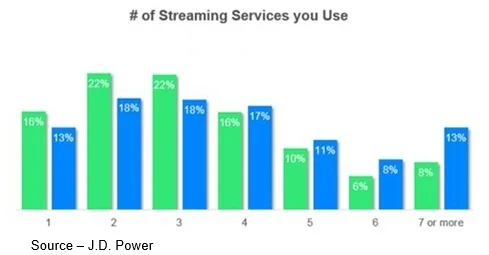
Our family has a range of movie and series tastes – News of the World, One night in Miami, Monster Hunter, Midnight Sky, Trial of the Chicago 7, Run, Flight Attendant, Bridgerton, Your Honor, Minion’s of Midas, The Crown, and yes, certainly others including the Queen’s Gambit.
Every service has some content you want to watch so what the heck … it’s only $4 or $8 or $15 or $18 and a few $35 or more a month.
The problem is that personal tastes change/evolve.
Spin-off after spin-off gets old and so do remakes, prequels and sequels–despite what focus groups and service executives like to tell us.
Besides, you didn’t sign up for their service because you liked their stuff.
Nope, you liked a show or two or three…
You know what you want to watch and…
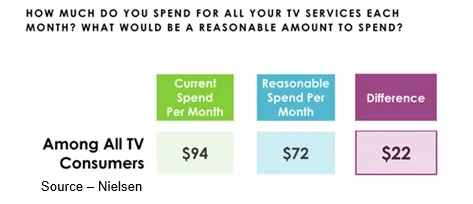
Surprise!
You got all the movies/series you wanted.
In addition, they included the programs they liked … or thought maybe you’d like.
Son of a gun, you’re right back spending the same amount you spent before for your cable bundle – and the cost keeps rising – except you now have to remember which shows/movies are available with each service.
“The pandemic forced people around the globe to stay at home and stream. What I want, when I want it became an ideal way for people to relax, share time with their families and escape,” Allan McLennan Padem Media Group chief executive, observed. “All of the services – SVOD, AVOD, P/TVOD – had a near captive audience.
“Netflix, with 200M subscribers; Amazon Prime with an estimated 150M subscribers and Disney+ (including Hulu, ESPN, Hotstar) with more than 100M subscribers all clearly benefitted from the Covid-affected markets. Roku, with close to 50-million active users, made a smart move by acquiring Quibi’s content to build out its ad-based offering to be rightfully part of the gang. Even Apple worked to get into the game,” he continued.
According to DEG’s latest report, compared to the prior year, consumer spending on home entertainment in 2020 grew more than 21 percent to a record $30 billion.
True, much of that growth was because movie theaters were closed and the pandemic forced all but essential workers to stay-at-home.
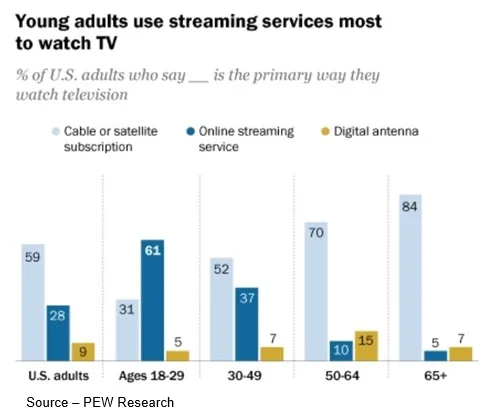
“But subscription growth for all of the services will be slower over the next four years because the market is not infinite,” McLennan warned, “Presently, 61 percent of young adults watch TV that they stream on a regular basis. To expand these audiences even further, whether younger or older viewers, takes time and money.
“To convince people to consider adding a new service or replace one of their services that they have history and comfort with because of their entertainment budget is equally challenging, expensive and difficult,” he added.
The goal in the next few years for the services is to incrementally attract, and keep, audiences without alienating others in the process.
In addition, while it still doesn’t feel like it, but the world is emerging from the pandemic and people want to get out more for dinner, a movie and go to the theater just to mingle.
Folks will reduce their streaming entertainment and possibly/probably unsubscribe from a number of services they pay for today.
That means using the data they gather about subscribers and their viewing habits will be focused on enhancing how they can present new, different, better content that will keep people interested, involved.
Netflix and Amazon Prime have done an excellent job of finetuning their user data capture and analysis with AI/ML (artificial intelligence/machine language) to improve the user experience.
The technologies enable them to evaluate what/when/how long and even where people view content so they can do a better job of recommending shows/films people will likely enjoy.
It also assists them in acquiring and creating new stories that will interest the broadest number of subscribers.
“The best marketing tool the streaming services have is for subscribers to recommend the material to friends/acquaintances, since more than 70 percent of new subscribers come from personal recommendations.” McLennan noted,
The better job a streaming service does in hyper-personalizing content for subscribers, lowering churn (people dropping one service to add a new one), and the more people will recommend shows and services to others.
That’s great but it’s really not personalizing content selection.

Sure, Netflix, Disney+, Prime Video, Apple TV+ and Discovery+ have enough of our data that BAM! they can offer subscribers content when we log in that they’re pretty sure we’ll like; and most of the time, they’re right.
“Each of the services are focusing on growing their direct-to-consumer business and strengthening their subscriber relationships which have proven to be key in advancing services and working to capture ROI,” McLennan said.
“Right now, the front runners are making better use of their subscriber data to create/acquire/personalize their services because they know that is the key to the future of their respective firms,” he added. “But it is going to become increasingly difficult for one service to continue being ‘home base’ for consumers online entertainment.”
Most entertainment discussions stop right there with people now saying they have 4-5 services and life is great (or is going to be).
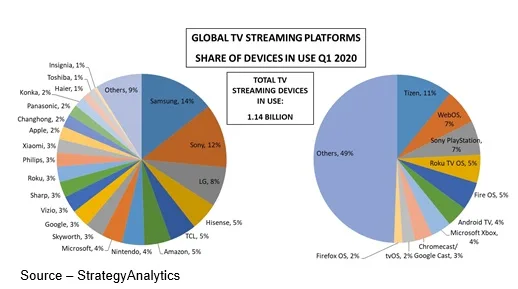
Most people simply bought the best smart TV solution they could afford with all of the streaming apps installed.
All we needed to do was connect the set to the internet and enjoy.
Fine … but!
Folks quickly found out that not all of the services they are attracted to may not be loaded on their set or they’ve been enhanced everywhere except on their set.
Tracking and “organizing” your streaming services on your big screen is difficult. People quickly discover there’s a world of content you can tap into (legally) if you just knew it was out there.
What streamers and screen people don’t bother telling you is that you can find and enjoy your content more simply by adding a media streaming device.
If all you want is video content, then inexpensive Amazon Fire TV, Android TV, Apple TV, Roku devices are all good.
They make it fast/easy to access your SVOD, AVOD, P/TVOD and even music services.
The more advanced units (more expensive) also support HDR, 4K, Dolby Vision, Dolby Atmos and voice control really are worth the few bucks more.
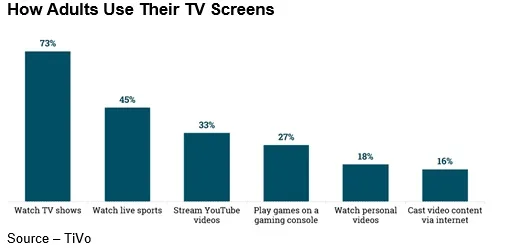
The internet-connected screen really can expand your horizons instead of simply letting you slowly become part of the furniture.
“More than a billion smart TVs are installed worldwide and streaming plus is rapidly becoming the focus of home entertainment whether you’re watching Netflix, Disney+, Tubi, Xumo, PlutoTV or any of the services.” McLennan continued
“In addition, streaming has rapidly become the primary access for education, remote work and other online activities including game play and more so, built-in smart functionality has now also become the new entertainment battleground.”
According to McLennan, the current race is between LG with WebOS, VIZIO’s SmartCast OS, Samsung with Tizen and Android TV, which is being customized/personalized by device manufacturers to deliver more services, capabilities and options.
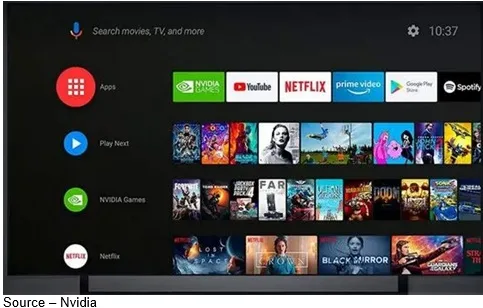
After discussing the pros and cons (and prices) of the various streaming device options with Jon Peddie, of Jon Peddie Research, and McLennan; we had two recommendations — the Nvidia Shield TV Pro or Roku Ultra.
The Shield is definitely priced at the upper end of the streaming devices but its AI upscaling and ability to support 60 fps UHD video as well as UHD HDR10 and Dolby Vision make us believe we’ll really appreciate our shows/movies including some of the new anime projects.
Of course, the kids were all for it because it’s built around Nvidia’s GPU, is multiplayer ready and with your game controller, you can waste hours playing stuff like Fortnite.
Today’s TV is no longer simply a siloed entertainment device that you measure by the quality/clarity of the content you see on the screen.
Suddenly, you have to also determine which streaming device and which operating system is best. And frankly, that’s a very personal decision.
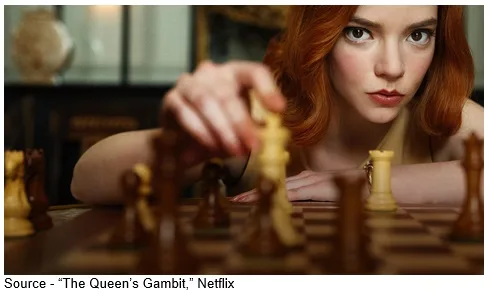 Home entertainment is becoming too important today to simply buy a screen, sign up for a couple of decent streaming services and kick back with a bowl of popcorn.
Home entertainment is becoming too important today to simply buy a screen, sign up for a couple of decent streaming services and kick back with a bowl of popcorn.
It’s more difficult than simply choosing cable or an antenna.
As Beth Harmon said in The Queen’s Gambit, ““I analyze games. What actually happened, not what could have happened.”
Maybe that’s why we weren’t as good as we should have been at chess in college.
# # #
[email protected] – is an author of more than 700 articles on management, marketing, communications and industry trends in media & entertainment, as well as consumer electronics, software and applications. An internationally recognized marketing/communications consultant with a broad range of technical and industry expertise in storage, storage management and film/video production fields; he has an extended range of relationships with business, industry trade press, online media and industry analysts/consultants.
